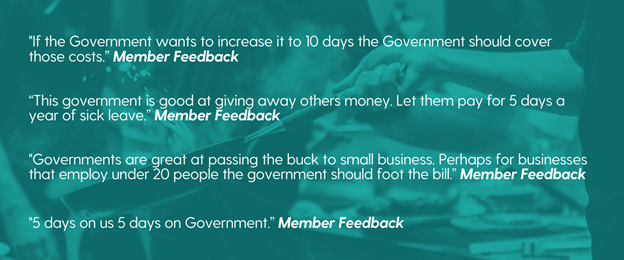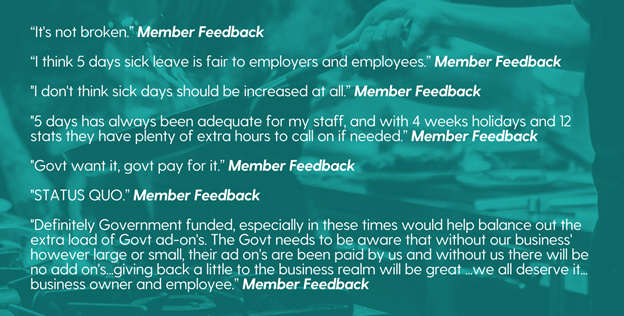Restaurant Association of New Zealand submission to the Education and Workforce Committee
Date: January 2021
INTRODUCTION
The Restaurant Association of New Zealand (the Restaurant Association) welcomes the opportunity to make a submission on the Holidays (Increasing Sick Leave) Amendment Bill (the Bill). We would welcome the opportunity to appear before the Select Committee in person.
Our submission has been compiled following nationwide surveying of our Association members from Friday, 22 January through Wednesday, 27 January 2021.
OVERVIEW
While the Restaurant Association supports the Government’s desire to ensure all workplaces are “fair, safe and productive” spaces, we are unable to support the Bill in its current form.
The Restaurant Association submits amendments to the legislation are required in order to ensure the Bill:
- gives appropriate credence to the impact of COVID-19 and unprecedented operating conditions many businesses across the country are continuing to navigate
- is not responsible for the failure of businesses – particularly those in sectors that have not yet fully recovered such as the service industry – at a time where change has been the only constant.
- does not create inequity in entitlement amongst workers within the same establishment.
We are especially concerned about the impact this Bill will have on hospitality businesses. The Government rightly holds the position that “if we invest in workers, if we treat them well…that is going to lead to more productive workplaces.” However our sector, much like tourism, remains at the behest of the Government’s border closures; further job losses and business closures remain a material risk.
The Restaurant Association submits that this is not the right time to impose more operating costs on businesses. The baseline cost increase that this Bill introduces, lands squarely on the shoulders of business owners. The cruel reality is, change of this kind is of no use if the workplace no longer exists.

RECOMMENDED CHANGES
Against the backdrop of an outright majority in Parliament, we submit the Select Committee recommend to Government the following amendments to the Bill:
- Specificity on pro-rated sick leave entitlement, speaking directly to full time or part time employment status.
- Having the extra leave associated with a specific COVID-19 provision rather than a wide sweeping provision for all would be a much more targeted approach and more manageable for businesses.
- Longer lead-in time for implementation.
These recommendations are covered in more detail on page 4.
BACKGROUND
The Holidays (Increasing Sick Leave) Amendment Bill proposes to increase the availability of employer funded sick leave for employees. It would do this by amending the Holidays Act 1993 to increase the minimum sick leave entitlement from 5 days per year, to 10 days per year.
The Government’s ambition to ensure all workplaces are “fair, safe and productive” spaces is laudable, and one we should all support. However, like many changes enacted across workplace relations and safety over the past three years, the Holidays (Increasing Sick Leave) Amendment Bill is another example of policy change being done to business, not with business. The lack of consultation with affected stakeholders is outlined in the Government’s own regulatory impact statement.
Sentiment from our members on the proposed changes was very clear: the changes outlined in this Bill will add undue pressure on already extremely tight operating margins. The extension of sick leave to ten days has been highlighted by members as one of their biggest concerns facing the businesses survival in 2021.
The reality is that in any workplace, you will have those that use workplace privileges as they were intended, and others that abuse them. We recognise the law changes seek to protect the honest, however it will be misused by those that seek to abuse the system. Yet in the absence of any improvements to the Bill, the only conclusion can be that the Government is comfortable the cost of misuse being exercised on small business.

While larger businesses may be able to more readily absorb these additional costs, hospitality businesses are usually small businesses operating on tight margins.
The additional costs to hospitality over the past few years have included minimum wage increases, rising food costs, COVID-19 operational requirements such as single-server, table service and physical distancing requirements, along with costs associated with additional equipment, PPE and cleaning products, meaning to stay solvent, price hikes are becoming inevitable.
The unfortunate truth however, is that hospitality does not operate in a retail duopoly where customers have limited choice. There are 18,000 hospitality outlets across New Zealand meaning businesses that put up their prices live in fear that the café next door will not, leaving them fighting a price war.
During our surveying, we asked members whether they had alternative suggestions to that which is proposed in the Bill. There were three distinct schools of thought:
- Government footing the cost of the additional entitlement
- Removing the accumulation entitlement
- Keep entitlements the same.
Commentary from members on these alternatives is provided later in our submission.
RECOMMENDED CHANGES EXPLAINED
The Restaurant Association submits the following amendments to the legislation should be considered:
- Specificity on pro-rated sick leave entitlement, speaking directly to full time or part time employment status.
- Having the extra leave associated with a specific COVID-19 provision, rather than a wide sweeping provision for all, would be a much more targeted approach and more manageable for businesses.
- Longer lead-in time for implementation.
1. Specificity on pro-rated sick leave entitlement, speaking directly to full time or part time employment status
We asked our members whether they agreed with full time and part time workers both receiving the same entitlement, as is currently proposed. An overwhelming majority of respondents (80.52%) believed that full time and part time employees should not receive the same entitlement, and rather part time employees should receive a prorated number of sick days based on the number of hours they work.
An additional 16% of respondents believed there should be consideration given to an alternative arrangement. Less than four percent of respondents believed a one-size-fits all approach to sick leave entitlements for both full time and part time employees was appropriate.

Many hospitality workers work one or two days a week and it seems unreasonable to allocate an additional five days to part-time employees.


There are a number of ways to resolve this issue, and we submit the Select Committee recommend the Minister seek further advice from officials on this matter and ensure the legislation sets out the entitlements with specificity. This will ensure the law does not unintentionally contribute to workplace disharmony and create legislated inequity among workers within a single establishment.
2. Develop a specific COVID-19 provision
Having the extra leave associated with a specific COVID-19 provision added to the bill rather than a wide sweeping provision for all would be a much more targeted approach and more manageable for businesses.
During the Bill’s first reading speech, the Minister responsible said that it had “become clear to the Government….that our current statutory minimum entitlement of five days sick leave per year…does not satisfy our ambition to ensure that the health and wellbeing of people and the risk of spreading infection is managed well.”
If the intention of Parliament is to ensure we are monitoring current health risks then it makes sense to have the extension of sick leave associated with a specific COVID-19 related provision. This leave could be granted for example to those that need to self isolate or are otherwise associated with a positive COVID-19 case.
We are concerned with the way in which this change appears to have been woven into the COVID-19 narrative: as if small business operations have been putting the Government’s COVID-19 response at risk and this is a corrective measure. In our view it is disingenuous for Treasury to put forward the view that employment standards could undermine the public health objectives that underpin the Government’s COVID-19 response.
In that regard, ask the Select Committee to give due consideration to the monumental sacrifice of many small businesses over the past 10 months – especially those that were unable to operate in any way at Alert Level Four – and whether this Bill in its current form is what is needed right now.
3. Longer lead-in time for implementation
At first reading the Minister responsible for the Bill said businesses were already requesting additional lead in time for implementation. The Minister’s suggestion of two months lead-in time for implementation after the legislation takes effect does not go far enough.

The Government has still not released a plan for reopening the borders. We understand this is challenging given the circumstances, however many other countries have created and published plans that sit alongside their vaccination strategies and implementation plans. This provides greater operating certainty that many businesses are looking to the Government to provide.
Given our sector relies so heavily on international tourism, the Restaurant Association submits the Government should delay any implementation around sick leave entitlements to 2022, when we presume there will be greater certainty around closed borders and a confirmed plan for New Zealand’s vaccine roll out.
OTHER NOTABLE SURVEY SENTIMENTS
Managing potential increases in labour cost
We asked our Members in what way(s) would they manage potential increased labour costs due to an increase in sick leave of entitlements:
- 64% of respondents said they would pass on costs by increasing menu prices;
- 63% said they would delay or avoid wage increases;
- 58% would reduce employees’ hours or take on fewer employees.
Employees coming to work sick because they ‘need the money’
We asked our Members whether employees would come to work sick when their leave entitlement is exhausted because they ‘need the money’. 67.74% of respondents said that their employees did not do this, with a vast number of respondents saying that the risk to their business was vastly outweighed any benefit – both to the employer or the employee – often advising the staff member to go home.
Many respondents noted their practice was often to grant employees additional sick leave, sick leave in advance, or the employee would just be paid anyway, as an acknowledgement of their value and commitment to the business.

COMMENTARY FROM MEMBERS ON ALTERNATIVES
Government footing the cost of the additional entitlement

Removing the accumulation entitlement

Keep entitlements the same

ONGOING ECONOMIC IMPACT OF COVID-19
It would not do the hospitality community justice if we did not make reference to the ongoing fallout affecting our sector following the devastating impact of COVID-19.
Data released on 9 December 2020 by Statistics New Zealand | Tatauranga Aotearoa paints a picture of two tiered recovery:
“Construction industry sales in the September 2020 quarter were up almost 9 percent compared with the same quarter last year, despite the impact of COVID-19 in the first half of the year, Stats NZ said today. In contrast, sales for many industries servicing tourism and travel were still lagging well behind levels seen last year.”
There is no doubt the cutting off of international tourism following the border restrictions imposed in March 2020, continues to take its toll on the sector’s recovery.
Services industry sales were down 5.3 percent ($2.4 billion) compared with September 2019.
Within our Association alone we have seen the financial and emotional impact this has had on many of our members. Most hospitality businesses are in survival mode and as we move through the first quarter of 2021, the biggest concerns have been highlighted as a return to lockdown (or heightened Alert levels), the minimum wage increase and the increase of sick leave entitlement to 10 days.
REGULATORY CONCERNS
The Restaurant Association must highlight its concern with the failure of consultation with the wider business community around the shape of the Bill. As noted by MBIE’s Regulatory Impact Analysis Review Panel in the regulatory impact statement (RIS):
“The Impact Statement has been produced under tight time constraints which has led to limitations in the policy process, in particular:
- A lack of consultation with affected stakeholders, particularly small businesses and businesses in the sectors that are likely to be most affected by the change.
- A limited range of options has been considered, particularly alternative sick leave duration periods and funding approaches (as adopted by other countries).
This means there is a risk that not all of the impacts of the proposed option have been identified and/or there were alternative options that could have resulted in better economic and social outcomes.”
The RIS refers to hospitality as one of the sectors most impacted by this change on several occasions. We have confidence the Select Committee will take on board the concerns and alternatives we have raised in our submission, and make appropriate recommendations to the Government.
ABOUT OUR ORGANISATION
The mission of the Restaurant Association of New Zealand is to be the link between good food and good business so that our Member’s restaurant or cafe can succeed. We’re passionate about our vibrant industry, which is full of interesting, talented and entrepreneurial people.
Since 1972, the Association has worked to offer advice, help and assistance in every facet of the vibrant and diverse hospitality industry. Our members cover the length and breadth of the country: we are organised into 13 regional branches and led by a national office located in Mt Eden, Auckland.
We now represent, advocate and cheerlead for more than 2,500 hospitality businesses in New Zealand, representing more than 20,000 employees.
Prior to COVID-19, New Zealand’s hospitality industry was thriving, employing more than 136,000 people, across 18,000 restaurants and food outlets, generating sales in excess of $12.1 billion.
CONTACT DETAILS
Marisa Bidois, CEO
The Restaurant Association of New Zealand
45 Normanby Rd
Mt Eden. Auckland 1024
(09) 638 8403
